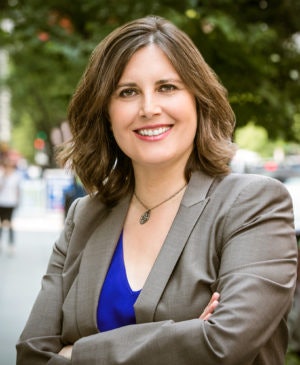Two-parent households are dwindling in the United States, with four out of 10 children being born to a single mother, according to a new report from the Institute for Women’s Policy Research (IWPR). Between 1999 and 2012, the number of single mothers attending college has nearly doubled.
 Dr. Barbara Gault
Dr. Barbara Gault“Because single mothers are a growing share of the population, we shouldn’t be surprised to see a growing share of college students raising kids alone,” said Dr. Barbara Gault, the IWPR executive director. “Single mothers’ economic situation requires that they maximize their human capital so that they can earn a living wage and support their families. College is a great way to do that.”
Nearly 2.1 million students, or 11 percent of all undergraduates, are single mothers, the majority of whom are women of color. Close to half, or 44 percent, attend community college. Of those attending community college, 43 percent say that they are likely to drop out due to the struggle to balance caring for their family with school attendance.
Coming in second behind community colleges are for-profit schools, which account for 30 percent of enrollments among single mothers. It should be noted that the IWPR report evaluates data from 1999 to 2012, meaning that the proportion of single mothers currently attending for-profits and community colleges may have shifted. Both sectors have seen declines in enrollment in recent years.
The high number of single mothers enrolled in for-profits was no accident, according to Gault. “For-profits specifically recruit single mothers,” Gault said.
Early on in the Obama administration, for-profits started running online ad campaigns targeted at mothers. Some ads claimed that the president wanted mothers specifically to attend college and had created grants aimed at that demographic. Text from one 2009 third-party ad ran, “Obama Asks Moms to Return to School.” The ads were not endorsed by Obama or the Education Department.
Critics say the ads relied on the implied endorsement of the federal government to bolster the credibility of the school by linking to information about existing federal programs, such as Pell grants. “[For-profits] can rely on the fact that the government is providing the money to let someone assume that their tuition is a reasonable value, because otherwise why would the federal government provide the grants and loans for it?” said Robert Shireman, senior fellow at the Century Foundation and former deputy undersecretary of ED during the Obama administration.
Attending a for-profit can be as costly or even more expensive than attending a private nonprofit. According to The Institute for College Access and Success, the average graduate of a for-profit school in 2012 left with $39,950 in debt, compared to the average debt of $32,300 from private schools and $25,550 from public colleges.
Despite the high cost, schools across the for-profit sector have varying degrees of success of graduate job placement, meaning that some students leave with student loan debt and limited prospects of employment in their chosen career.
Far from supporting the for-profit industry, Obama’s Education Department began cracking down on bad actors within the sector by cutting off their access to federal funds. Such actions led to the collapse of for-profits such as the Corinthian Colleges systems and ITT Tech. As recently as August, the for-profit Charlotte School of Law closed its doors after ED blocked its access to federal student aid dollars in December 2016.
“It’s interesting because we haven’t seen public colleges carry out that same kind of outreach to single mothers which would benefit both the colleges and the mothers,” Gault said. “So in one sense, there may be some lessons to learn on the part of public colleges on how for-profit colleges have succeeded in helping single parents achieve their educational goals.”
Career Education Colleges and Universities (CECU), an association based in Arlington, Virginia, representing for-profit schools, could not be reached for comment.
The report underscored several other barriers that single parents face on their way to a degree. At the same time that more single mothers than ever are attending college, services for student parents have been reduced. Many schools across the country have had to close childcare centers on campus due to funding issues.
At the federal level, funding for the federal Child Care Access Means Parents in School Program (CCAMPIS) program, which helps thousands of low-income parents in college afford childcare while in college, was threatened earlier this year. Budgets from the White House and the House of Representatives would have eliminated funding for CCAMPIS altogether, but the program was restored to $15 million in the Senate budget.
“I think we need to dramatically increase access to childcare for single mothers in college,” Gault said. “While campus childcare programs are a small fraction of the need, we should certainly be trying to preserve those that exist.”
Other initiatives could help improve access to childcare, Gault added, such as making public subsidies more available to community college students to pay for childcare, and expanding funding to existing programs.
Helping more single mothers achieve a degree has many benefits, both to parents and their children, and to society at large, Gault said.
“The benefits are reductions in poverty, increased employment and the tax revenues that follow, improved civic engagement, health benefits and multi-generational benefits,” Gault said. “Research shows that when mothers attain higher education their children are much more likely to go on and get a college degree themselves.”
Staff writer Catherine Morris can be reached at cmorris@diverseeducation.





















